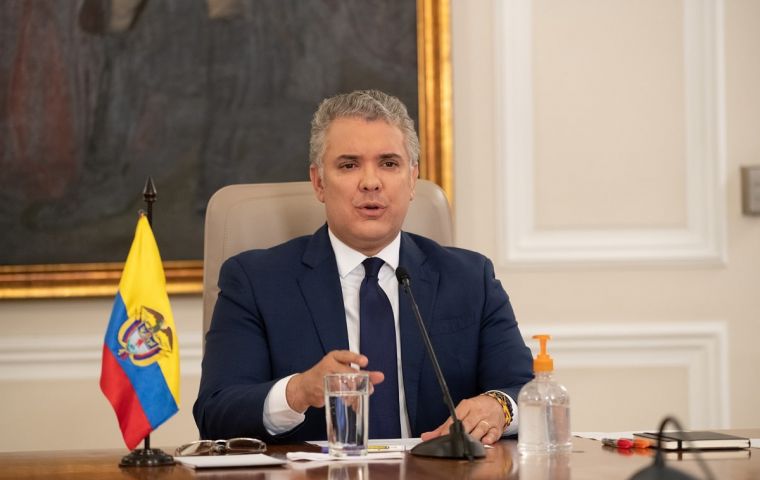MercoPress. South Atlantic News Agency
Colombian President Duque appoints new finance minister but unrest is far from under control
 Although Duque said he was open to dialogue, in a presidential address he ordered the militarization of cities such as Cali, Medellín and Bogotá
Although Duque said he was open to dialogue, in a presidential address he ordered the militarization of cities such as Cali, Medellín and Bogotá Colombia's Finance Minister Alberto Carrasquilla turned in his resignation Monday President Iván Duque withdrew the controversial tax reform which triggered massive demonstrations nationwide, which have so far left 19 people dead.
“My continuity in the government would make it difficult to quickly and efficiently build the necessary consensus,” Carrasquilla said in the statement in which he announced his resignation and in which he described his tax reform as “imperative.”
Meanwhile, Duque announced on Twitter that “I have accepted the resignation of Dr Alberto Carrasquilla as Minister of Finance. My gratitude and respect always for his contribution to the head of the economic team” and thanked him for his involvement in the “unprecedented social program to face the pandemic.”
But Carrasquilla's resignation was not enough, even if it was joined by that of his second-in-command, Deputy Minister Juan Alberto Londoño, with whom he co-authored the tax reform bill, which provided an increase in the Value Added Tax on services and products and wages.
Organizations and union leaders stayed out in the streets of Bogotá until late Monday to make sure their interests were not affected by whichever step Duque decides to take after the appointment of José Manuel Restrepo to replace Carrasquilla.
According to the National Unemployment Committee, there were 27 deaths between April 28 and May 3, in addition to 124 injuries, and 727 arbitrary arrests within the framework of the massive day of mobilizations.
Although Duque said he was open to dialogue, in a presidential address he ordered the militarization of cities such as Cali, Medellín and Bogotá (capital), which intensified the denunciations of repression against young participants.
The National Unemployment Committee has since demanded that the Executive demilitarizes all urban areas, which goes against the Constitutional right to peaceful demonstrations. “We once again summon all citizens to maintain and increase mobilizations,” they added.
The requests, in addition to the withdrawal of the tax reform that has already been achieved, the Committee requests the withdrawal of Bill 010 of the Health reform and the strengthening of the vaccination plan.
Among the demands, there was also the creation of a basic income; the defence of national agricultural production; support for small businesses; zero enrollment; rejection of educational alternation and stopping forced eradication and spraying with glyphosate, among others.
A full-scale nationwide mobilization is scheduled for Wednesday, May 5th by labour unions, student organizations and indigenous peoples.




Top Comments
Disclaimer & comment rulesCommenting for this story is now closed.
If you have a Facebook account, become a fan and comment on our Facebook Page!